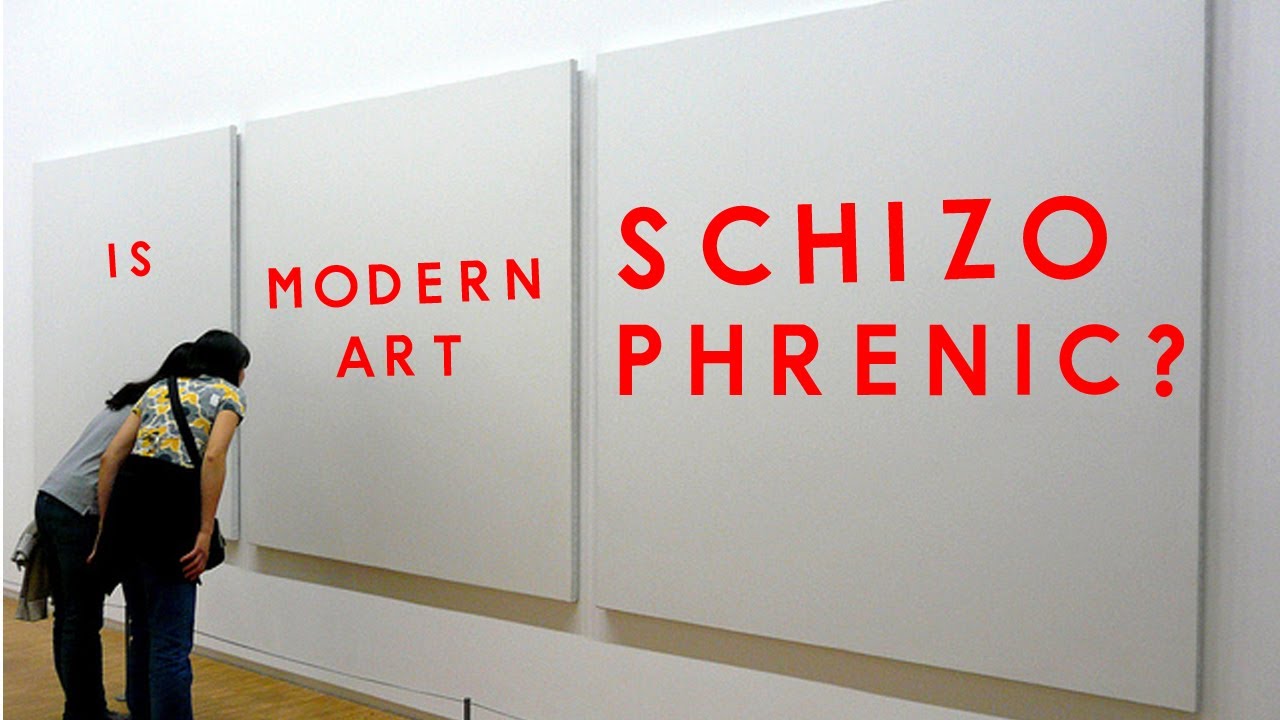Thoughts on Thinking
In this video I ask the question: is modern art schizophrenic? & if so is it because we live in a world dominated by left hemisphere apprehension?
through psychological development and evolution as a species we have developed an over reliance for the left hemisphere and its modes of apprehension towards the world (most predominately in the west) and how this way of understanding the world mirrors the phenomenology of schizophrenia, by observing its relative symptoms and its induced experiences which are dominated mostly through the left hemisphere we can analyse the progression of art through modernism and post modernism to provide adequate evidence for such a theory using the relative scientific literature by analysing art forms such as: cubism, pointillism, dadaism, abstract art, minimalism, absurdism and surrealism.
Artists I mention: Picasso, Kazimir Malevich, Egon Schiele, Stanley Spencer Tristan Tzara, Clement Greenberg
Support me on Patreon (thank you!) https://www.patreon.com/thoughtsonthinking
Most of this video references the work of:
– psychiatrist Iain McGilchrist and his book: The Master & His Emissary
https://www.amazon.com/Master-His-Emissary-Divided-Western/dp/0300188374
– psychologist Louis Sass and his book: Madness & Modernism
https://www.amazon.com/Madness-Modernism-Insanity-Literature-Thought/dp/0674541375/ref=sr_1_2?crid=L7IF4RCRO2N9&dchild=1&keywords=madness+and+modernism&qid=1594394441&s=books&sprefix=madness+and+mo%2Cstripbooks-intl-ship%2C264&sr=1-2
Source




SIGN UP TO NEWSLETTER // WEBSITE: thoughtsonthinking.org
A Fun Fact: Most schizophrenics actually believe others are crazy, and not them. 🙂🤏🏾🤏🏾 ✋🏽😤
Thanks, insightful take on the topic. It'd be interesting to follow up with how modern music relates to the left hemisphere.
I hated Aristotelian thinking, and one day i found Spinoza: "Nobody has determined yet what the body is capable of" Only the body, self knows what it can be, or do, this broadens existence far beyond rationalism
I'd venture that Jordan Peterson has art of Lenin in his house as motivation – an enemy and ideology that must be defeated. Seeing it spurs action in him I'd imagine. This is opposed to most people's practice of decorating their homes with relaxing, comforting art and styles. I could see Peterson as someone who wouldn't be interesting in making a cozy, cocoon-like dwelling.
We can easily assume that art is a projection of the artist's inner self. However, in the past artists' consciousness was completely absorbed in ideas or higher principles that were outside their grasp but concealed in the faith in God and religions, and ancient teachings, as fixed points, that limited the form, but not the content. These principles worked as inspirations as if they were part of the artist's inner world but most important they were also the same valus shared by the society at that time. Therefore the result was a work that eveybody could understand and appreciate on an conscious/unconscious level. Nowadays art is a mere projection of the people's ego and we are scattered among different personality who want to impose their personal points of view. But art in this way has lost its universal language
You are discussing modernism and schizophrenia in such a way without referencing Deleuze and Guattari's work Capitalism and Schizophrenia. Even if D&G's works on the topic (the Anti-oedipus and A thousand plateaus) are not scientific, they are fundamental to see how modernism sees itself in this terms. While you refer to postmodernist thinking as "seeing the world as words", you miss the point of searching postmodernists beyond Derrida. See Deleuze for a more metaphysical approach to reality and it's desiring machines. A work of art is not simply a question without meaning pointed to the reader long enough, it is rather a combination of machines and a production of something. See how Deleuze put the Schizophrenic relations to nature and reality, as a relation between machines in nature and machines in body. Capitalism helps and Deleuze foresaw the 21st century as "an era of schizophrenia" in relation to the era of neurosis founded by Freud and Lacan (and Zizek and all Lacanians, who in fact care more about words then about the world)
Reminds me of the overwhelming popularity of deconstructionist view points, which traditional forms of meaning are now shaky and more riddled with pessimism or nihilism. I notice this in myself, the overemphasized attention to what i do and how i am, and it's an eerie paralysis or meta-awareness
ok so art for arts sake, modernism..bad….when the soviets snuff out art for arts sake and modernism in favor of more romantic traditional styles with an avowed social dimension….also bad?
the right/left brain model is quite inaccurate or unscientific by modern standards.
Thanks for your post.
It was refreshing to see a point of view, that although I do not agree in most part, it has dedication and investigation. And for that makes me think more deeply into my own ideas about reality, art and myself.
For some points I can not agree on the first being the left/rigth side dualism, as for my understanding of the current knowledge, there is no such thing. While there are in fact areas of the brain that are more affected to some expertise, the plasticity of the brain will distribute the processes where needed independently of the side of the brain. That is an old misconception that with new knowledge has been debunked.
Another is the separation of the arts, talking about art in general but specifically target painting is a fairly common behavior. But art can be recorded in all conceivable manners, shapes and media. So if to talk about art we should look in the broad spectrum of it's existence. Modern art was expressed in music, painting, dance, architecture, film, photography, science, food, design and a long etc.
Another point is the constant application of conservative beliefs, making the before better than the now. In the example of nazism and the violence brought about: independently of the technology used, war for power using populist rethoric was not new. Human were killing themselves in war since the beginning of time. The fear that leads to the tribalistic diminishing of the other into a thing to be destroyed is almoust rooted into our DNA. Will we think that the acts of alexander the great where something other than horrific? We can't blame modernist ideas on those can we?
Also the speech tends to a normalization of the self into a conceived ideal of what a human should be, behave and create. The speech takes a very narrow/ black and white perspective of the times. Let's not forget about the greater amount of people who could access to art studies, the greater amount of information and it's speed due to new communication technics. The larger number of people who could afford to buy art, and it's availability.
That all makes for a much greater number of experimentation, for the sheer number of people working on the different media, and also the large amount of people with different tastes to consume.
That immense progress in art came about at the same time as so much other progress in all fields of human knowledge. If we continued tied to the past, I would be not able to write this to you.
Also agriculture was always a commodity in human economics as it is thought of as being a medium to increase human comfort.
Of course please take this commentary with a grain of salt. Other than architecture (my artistic medium of choice) I am not a specialist in economics, physics or neurology. But I am read in those subjects, and I would recommend you to investigate more on the topics so to make your own judgment.
Art as a metric for the evolution of the neurophysiological and psychological state of a human society.
"Of all people only those who make time for philosophy are at leisure, only they are truly alive." – Seneca the Younger, On the Shortness of Life. And with leisure and life, come the arts . . .
Are there any videos of patients displaying these symptoms as a result of hemisphere damage?
Weber: disechanted world. Berger: homeless mind, Sacred canopy meanings, Anomie. Giddens: disembeded mechanisms.
Is there a transcript available?
Thanks 🙂
Great content!
More on music
I’m almost done reading The Master and His Emissary, and I think you articulated McGilchrist’s ideas incredibly well! Here’s an idea that you might appreciate:
McGilchrist shows in several ways that each hemisphere is capable of having an autonomous will… what if the driving force, or “will center” of the left hemisphere is dictated, or at least highly influenced, by Jung’s notion of the Ego, whereas the “will center” of the right hemisphere is the essentially the Self? To me, there seem to be many correlations between each of these pairs, such as their likely evolutionary origins, affects on phenomenology, and their relationship with one another. Perhaps the Self is the master of the egoic emissary, which has become too independent, or in Erich Neumann’s terms, “overdifferentiated.” Enjoy this food for thought, and thank you for your work!
Maybe this applies more to the ppl who have financed and propagated "modern" art.
This was a really clear, well constructed and engaging video . Thank you for posting this 🙂
Hello. I'm probably in the wrong place here, but I couldn't find an e-mail address for you. (You do have one for "business" but I've heard those are generally ignored.) You had a video titled something like, "Friedrich Nietzsche and the Paradox of the Neo-Nazis". I was going to watch it, but I can't find it now on your video archives, or through any of the search engines. Did you or YouTube take it down? Has it been posted anywhere else? I'm not into Instagram or Twitter and don't really want to go there. Thanks.
I've had this thought about art, especially Picasso's. The real rabbit hole is in what causes schizophrenia. I think it is no more, and no less, genetic than heart disease. And it is, in my belief, a neurological disorder with psychological symptoms rather than simply a psychological disorder.
Jesus christ, what a trip, thank you for this video
Greatly insightful, thank you very much
Ashkenazi 101
I knew from the title itself it was Master and His emissary. Mcgilchrist opened by eyes on both neurology and phenomenology.
no word about the invent of the camera ? that event kill the figurative art and push to paint far away the machine
please active automatic subs